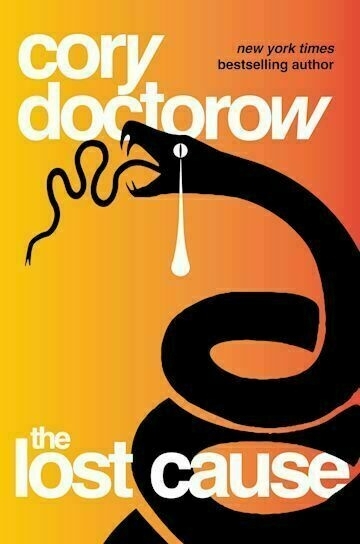📚 Finished reading The Lost Cause by Cory Doctorow.
This book is set in California, three decades into the future. Climate change has continued to ravage the world. Large parts of the US have been rendered uninhabitable by floods, fires, pandemics et al. That naturally created a lot of internal climate change refugees.
But it’s not entirely dystopian. It got so bad that the US government and its citizenry finally managed to muster up a response that actually sets out to mitigate the worst of the impact, although it required a fairly radical liberal president who brought in a Green New Deal (GND) and didn’t mind ignoring the courts to do so. Who was unfortunately replaced with a rather less effective one by the time the book was set.
Much of the citizenry are also heavily engaged in building back better where it’s still possible to do so. Carbon neutral factories, lots of clean energy and an enthusiasm for building safe and dense housing in places where it’s possible to do so. A gig-like green jobs guarantee means that everyone who wants to work can do so, with plenty of training on hand, all in the cause of protecting humans and the environment. Refugees are generally welcomed and celebrated for the many benefits they bring to their new homes.
This anyway is the life of the protagonist, Brooks, who gets a sense of satisfaction and accomplishment from helping humanity preserve itself and its environment. Lovely, if a little simplistic, and his late-teen dialogue grates a little at time. Maybe I’m just old.
But not everyone is a Brooks. There’s still a mostly old-white-men vanguard who aren’t in line with these new vibes - the MAGA club. These folk hate the GND, they hate the idea of refugees streaming into their historic homes, of welfare programs and so on. Some are into strange conspiracy theories or the weird ideas based around sovereign citizenship. At first they didn’t believe in climate change. Now they think it’s too late to do anything about it so simply want to preserve what’s left of their old way of life.
Separately there’s also the crypto posse, a group of the mostly mega rich tech bro types who live their life on a giant boat. They’re only interested in big technological solutions to the catastrophe - seed the atmosphere, figure out how to go live on Mars - in between living the Bitcoin lifestyle where the freedom and well-being of money is more important than that of people, with the possible exception of the hallowed grindset innovator types.
All the stereotypes are there, although to be fair an overt effort is made now and then to not paint this as a simple battle between good and evil. In reality, people usually have reasons for their beliefs and actions that aren’t just ‘I want to be evil’.
…the Magas didn’t want to watch the world burn. They sincerely wanted to save it. They weren’t wrong because they were cruel.
They were cruel because they were wrong.
Doctorow’s politics certainly shine through. If you’re a reader of his blog you will be familiar with some of the arguments implicitly presented in this book, often the case with his novels. It follows a long line of what might be called ‘activist fiction’ - if nothing else providing a much more accessible entrance to the relevant ideas to the uninitiated than a dry textbook would, and a vision of what might be possible to the already-sympathetic.
For earlier attempts on adjacent topics, the Guardian provides a list of another 10 books they term ‘eco-fiction’, going back as far as to 1962 for JG Ballard’s ‘The Drowned World’.
It might be unusual to come away from a story where central points include climate change ruining the world and people mistreating each other with positive feelings, but this one definitely gives a sense of hope. Ideas of what could be done to change the current trajectory of humankind, visions of a kinder, more effective, competent and empathetic society even whilst such a thing feels hard to imagine right now. No doubt this is somewhat because my politics are quite similar to the author. It’s nice to imagine a world where the main arguments around climate change, refugees and the like have largely been settled in a progressive way. And furthermore where their implication have been practically implemented into everyday life giving people a sense of progress, of purpose, as they develop and use technology for motives other than rank financial profit.
Now it’s the remaining few disbelievers, those who don’t share certain ’progressive’ values, that are the oddbods, albeit often ones with still substantial access to power. Of course it’d be rather a shame if it takes the same catastrophic destruction of much of today’s world to get us to a similar place in reality.
